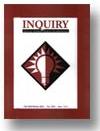Critical thinking is the intellectually disciplined process of actively and skillfully conceptualizing, applying, analyzing, synthesizing, and/or evaluating information gathered from, or generated by, observation, experience, reflection, reasoning, or communication, as a guide to belief and action. In its exemplary form, it is based on universal intellectual values that transcend subject matter divisions: clarity, accuracy, precision, consistency, relevance, sound evidence, good reasons, depth, breadth, and fairness. It entails the examination of those structures or elements of thought implicit in all reasoning: purpose, problem, or question-at-issue, assumptions, concepts, empirical grounding; reasoning leading to conclusions, implications and consequences, objections from alternative viewpoints, and frame of reference. Critical thinking - in being responsive to variable subject matter, issues, and purposes - is incorporated in a family of interwoven modes of thinking, among them: scientific thinking, mathematical thinking, historical thinking, anthropological thinking, economic thinking, moral thinking, and philosophical thinking.
Decision-making is the study of identifying and choosing alternatives based on the values and preferences of the decision maker.
Making a decision implies that there are alternative choices to be considered, and in such a case we want not only to identify as many of these alternatives as possible but to choose the one that best fits with our goals, desires, lifestyle, values, and so on. Decision-making is the process of sufficiently reducing uncertainty and doubt about alternatives to allow a reasonable choice to be made from among them. This definition stresses the information gathering function of decision-making.
It should be noted here that uncertainty is reduced rather than eliminated. Very few decisions are made with absolute certainty because complete knowledge about all the alternatives is seldom possible. Thus, every decision involves a certain amount of risk.
The authors of the materials for this course define critical thinking and decision making as the following. Critical thinking...



Charming
Great endurance. Spoke elegant. I just wanted to appraise you on your writning. I am a student at the University of Georgetown. This is my first time here. Your writing is very academic. Nice work you did.
10 out of 11 people found this comment useful.